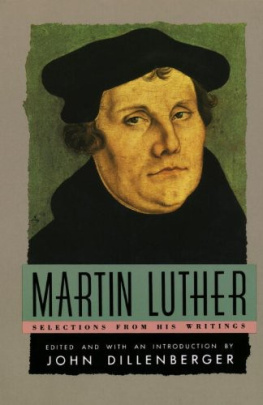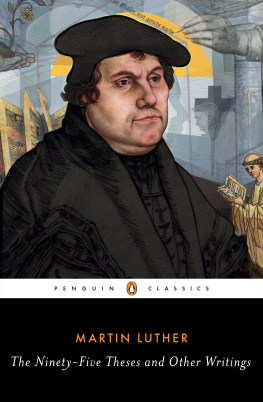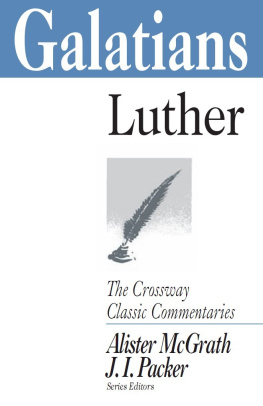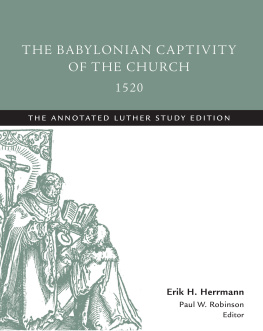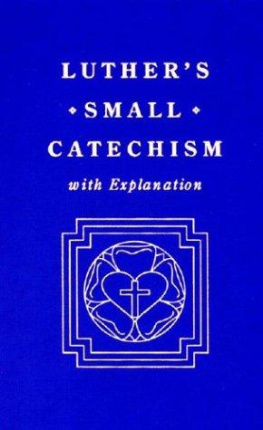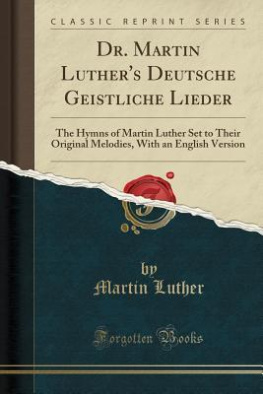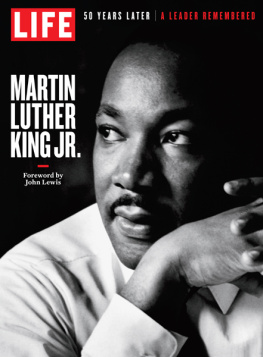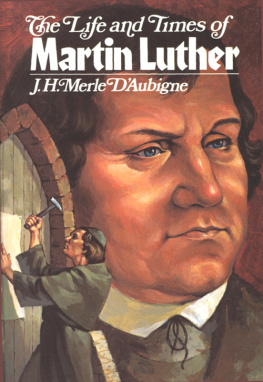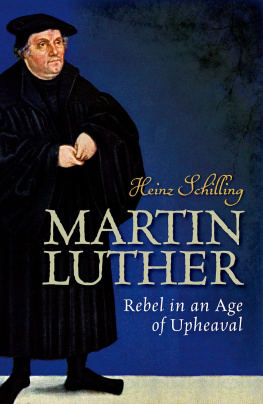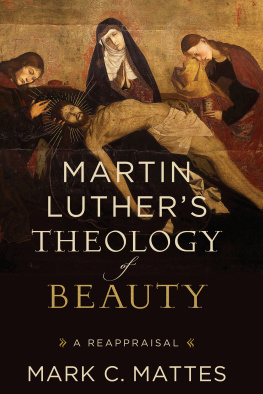Martin Luther - Martin Luther
Here you can read online Martin Luther - Martin Luther full text of the book (entire story) in english for free. Download pdf and epub, get meaning, cover and reviews about this ebook. year: 2011, publisher: Knopf Doubleday Publishing Group, genre: Religion. Description of the work, (preface) as well as reviews are available. Best literature library LitArk.com created for fans of good reading and offers a wide selection of genres:
Romance novel
Science fiction
Adventure
Detective
Science
History
Home and family
Prose
Art
Politics
Computer
Non-fiction
Religion
Business
Children
Humor
Choose a favorite category and find really read worthwhile books. Enjoy immersion in the world of imagination, feel the emotions of the characters or learn something new for yourself, make an fascinating discovery.
- Book:Martin Luther
- Author:
- Publisher:Knopf Doubleday Publishing Group
- Genre:
- Year:2011
- Rating:3 / 5
- Favourites:Add to favourites
- Your mark:
- 60
- 1
- 2
- 3
- 4
- 5
Martin Luther: summary, description and annotation
We offer to read an annotation, description, summary or preface (depends on what the author of the book "Martin Luther" wrote himself). If you haven't found the necessary information about the book — write in the comments, we will try to find it.
Martin Luther — read online for free the complete book (whole text) full work
Below is the text of the book, divided by pages. System saving the place of the last page read, allows you to conveniently read the book "Martin Luther" online for free, without having to search again every time where you left off. Put a bookmark, and you can go to the page where you finished reading at any time.
Font size:
Interval:
Bookmark:
FOR FURTHER READING ON LUTHER
Biography
Bainton, Roland H., Here I Stand, Nashville: Abingdon-Cokesbury Press, 1950; New York: New American Library, 1955 (Paperback).
Boehmer, Heinrich, Road to Reformation, trs. by John W. Doberstein and Theodore G. Tappert, Philadelphia: Muhlenberg Press, 1946; New York: Meridian, 1957 (Paperback).
Rupp, Gordon, Luthers Progress to the Diet of Worms, Chicago: Wilcox and Follett Co., 1951.
Thiel, Rudolf, Luther, trs. by Gustav K. Wiencke, Philadelphia: Muhlenberg Press, 1955.
Luther in Context
Bornkamm, Heinrich, Luthers World of Thought, trs. by Martin H. Bertram, St. Louis: Concordia Publishing House, 1958.
Fife, Robert H., The Revolt of Martin Luther, New York: Columbia University, 1957.
Schwiebert, E. G., Luther and His Times, St. Louis: Concordia Publishing House, 1950.
Reformation Period
Grimm, Harold J., The Reformation Era, New York: The Macmillan Co., 1954.
Harbison, E. Harris, The Age of Reformation, Ithaca, N. Y.: Cornell University Press, 1955.
Holborn, Hajo, A History of Modern Germany, The Reformation, New York: Alfred A. Knopf, 1959.
Lindsay, T. M., Luther and the Reformation, Grand Rapids, Michigan: Zondervan, 1955.
The New Cambridge Modern History, II, The Reformation, Cambridge at the University Press, 1958.
Theological Views
Pauck, Wilhelm, The Heritage of the Reformation, Glencoe, Illinois: Free Press, 1950, 1960.
Rupp, Gordon, The Righteousness of God, London: Hodder and Stoughton, 1953.
Watson, Philip S., Let God Be God, Philadelphia: Muhlenberg Press, 1950.
Special Problems
Bizer, Ernst, Fides ex Auditu, Eine Untersuchung ber die Entdeckung der Gerechtigkeit Gottes durch Martin Luther, Neukirchen Kreis Moers, 1958.
Cranz, F. Edward, An Essay on the Development of Luthers Thought on Justice, Law, and Society, Cambridge, Mass.: Harvard University Press, 1959.
Erikson, Erik H., Young Man Luther; A Study in Psychoanalysis and History, New York: W. W. Norton and Co., 1958.
Forell, George W., Faith Active in Love, New York: The American Press, 1954.
Gyllenkrok, Axel, Rechtfertigung und Heiligung in der frhen evangelischen Theologie Luthers, Uppsala und Wiesbaden, 1952.
Lazareth, William H., Luther on the Christian Home, Philadelphia: Muhlenberg Press, 1960.
Pelikan, Jaroslav, Luthers Works, Companion Volume, Luther the Expositor, St. Louis: Concordia Publishing House, 1959.
Prenter, Regin, Spiritus Creator, trs. by John M. Jensen, Philadelphia: Muhlenberg Press, 1953.
Sasse, Hermann, This Is My Body; Luthers Contention for the Real Presence in the Sacrament of the Altar, Minneapolis: Augsburg Publishing House, 1959.
Vajta, Vilmos, Luther on Worship, trs. and condensed by U. S. Leupold, Philadelphia: Muhlenberg Press, 1958.
Wingren, Gustaf, Luther on Vocation, trs. by Carl C. Rasmussen, Philadelphia: Muhlenberg Press, 1957.
General Essays
Martin Luther Lectures, Decorah, Iowa: Luther College Press.
Volume ILuther Today, 1957
IIMore About Luther, 1958
IIIThe Mature Luther, 1959
IVLuther and Culture, 1960
of Luthers Latin Writings
Wittenberg, 1545
[While the 1545 preface to Luthers Latin writings is chronologically the latest item to appear in these selections, it has deliberately been chosen to be the first item. Luther, in the year before his death, here reviews his life, the context in which he lived and worked, and the discovery of the meaning of justification by faith. As such, it provides a picture of how Luther saw himself and his work. This is true in spite of the fact that there are historical problems occasioned by the fact that Luther undoubtedly did not correctly remember everything as it happened. The dating of the break-through in understanding justification, as was indicated in the Preface,has continued to plague historians. But, in spite of this, the Preface is a good point of departure for understanding and reading Luther.]
Martin Luther wishes the sincere reader salvation!
For a long time I strenuously resisted those who wanted my books, or more correctly my confused lucubrations, published. I did not want the labors of the ancients to be buried by my new works and the reader kept from reading them. Then, too, by Gods grace a great many systematic books now exist, with which a theologian and a bishop can be beautifully and abundantly prepared to be mighty in preaching the doctrine of piety, especially since the Holy Bible itself can now be had in nearly every language. But my books, as it happened, yes, as the lack of order in which the events transpired made it necessary, are accordingly crude and disordered chaos, which is now not easy to arrange even for me.
Persuaded by these reasons, I wished that all my books were buried in perpetual oblivion, so that there might be room for better ones. But the boldness and bothersome perseverance of others daily filled my ears with complaints that it would come to pass, that if I did not permit their publication in my lifetime, men wholly ignorant of the causes and the time of the events would nevertheless most certainly publish them, and so out of one confusion many would arise. Their boldness, I say, prevailed and so I permitted them to be published. At the same time the wish and command of our most illustrious Prince, Elector, etc., John Frederick was added. He commanded, yes, compelled the printers not only to print, but to speed up the publication.
But above all else, I beg the sincere reader, and I beg for the sake of our Lord Jesus Christ himself, to read those things judiciously, yes, with great commiseration. May he be mindful of the fact that I was once a monk and a most enthusiastic papist when I began that cause. I was so drunk, yes, submerged in the popes dogmas, that I would have been ready to murder all, if I could have, or to co-operate willingly with the murderers of all who would take but a syllable from obedience to the pope. So great a Saul was I, as are many to this day. I was not such a lump of frigid ice in defending the papacy as Eckpope to this day, like Epicureans! I pursued the matter with all seriousness, as one, who in dread of the last day, nevertheless from the depth of my heart wanted to be saved.
So you will find how much and what important matters I humbly conceded to the pope in my earlier writings, which I later and now hold and execrate as the worst blasphemies and abomination. You will, therefore, sincere reader, ascribe this error, or, as they slander, contradiction, to the time and my inexperience. At first I was all alone and certainly very inept and unskilled in conducting such great affairs. For I got into these turmoils by accident and not by will or intention. I call upon God himself as witness.
Hence, when in the year 1517 indulgences were sold (I wanted to say promoted) in these regions for most shameful gainI was then a preacher, a young doctor of theology, so to speakand I began to dissuade the people and to urge them not to listen to the clamors of the indulgence hawkers; they had better things to do. I certainly thought that in this case I should have a protector in the pope, on whose trustworthiness I then leaned strongly, for in his decrees he most clearly damned the immoderation of the quaestors, as he called the indulgence preachers.
Soon afterward I wrote two letters, one to Albrecht, the archbishop of Mainz, who got half of the money from the indulgences, the pope the other halfsomething I did not know at the timethe other to the ordinary (as they call them) Jerome, the bishop of Brandenburg. I begged them to stop the shameless blasphemy of the quaestors. But the poor little brother was despised. Despised, I published the
Font size:
Interval:
Bookmark:
Similar books «Martin Luther»
Look at similar books to Martin Luther. We have selected literature similar in name and meaning in the hope of providing readers with more options to find new, interesting, not yet read works.
Discussion, reviews of the book Martin Luther and just readers' own opinions. Leave your comments, write what you think about the work, its meaning or the main characters. Specify what exactly you liked and what you didn't like, and why you think so.

